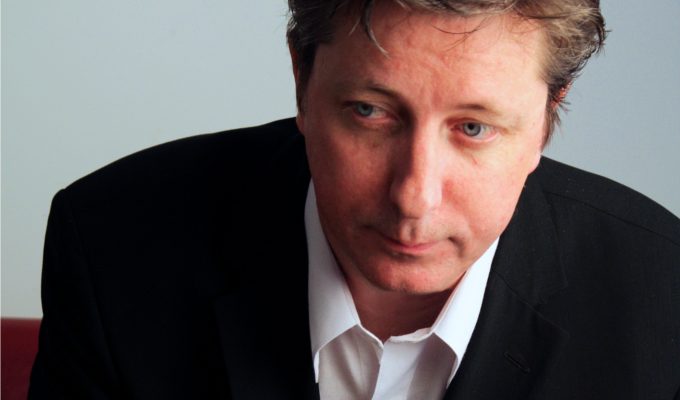 “Amateur” (1994)
“Amateur” (1994)
Hartley was in Cannes for the second straight time with his fourth film, 1994’s “Amateur,” this time with a big French star in tow. Isabelle Huppert plays a fallen nun who has taken to writing pornographic stories and smoking too many cigarettes in a dilapidated diner, when in strolls Martin Donovan as a man with amnesia. As the two of them begin to unravel the secret of his identity, a mysterious woman of Romanian extraction (Hartley regular Elina Lowensohn) insinuates herself into their circle. Although she may provide the key for figuring out just who this mystery man is, she refuses to relinquish it, holding a bitter grudge for his actions in his unremembered past, even as dangerous characters begin to surface who mean harm to them both. “Amateur” has a simply unbeatable soundtrack (Yo La Tengo, My Bloody Valentine, Sonic Youth and Pavement among others) and was the first of Hartley’s films to integrate seemingly realistic violence into his cerebral, absurdist style. As it’s aged it seems more and more like some kind of perverse riff on the concerns of Antonioni‘s “The Passenger” filtered through Hartley’s peculiar preoccupations. Don’t blink or you might miss early appearances by Michael Imperioli (as a bouncer in a Sonic Youth tanktop!) and Tim Blake Nelson. If only Quentin Tarantino had been hit by a car or taken up rowing instead of showing up on the Croissette with “Pulp Fiction” at that same Cannes, we might be talking about this film as one of the central American crime pictures of the era. [B+]
 “Flirt” (1995)
“Flirt” (1995)
For all the comparisons raised between Hartley and Woody Allen over the years, there’s a crucial one that’s been overlooked: both filmmakers like to play with formal conventions. And that’s never been more true for Hartley than with “Flirt.” Expanded from a half-hour short that makes up the first third of the film, it begins with commitment-phobe Bill (Bill Sage) whose lover (Parker Posey, in her first appearance for the director) presses him to make a proper committment, or she’ll leave for Paris. Hedging his bets, he goes to find another woman he’s also been seeing, but is instead confronted by her gun-wielding husband. Once that wraps up, we see the same story again, firstly with Bill replaced by Dwight (Dwight Ewell), an ex-pat in Berlin choosing between two male lovers, and then by Miho (Hartley’s wife Miho Nakaidoh), whose film director beau (Hartley, playing himself, and at one point carrying a canister of film labeled “Flirt”) has given her the same ultimatum in Tokyo. Each short, individually, is classic Hartley stuff (the first being the best), and the project’s an undeniably fascinating exercise, more or less a must-watch curio for any aspiring moviemakers or screenwriters. But all three watched back-to-back is a fairly trying experience; while there are slight differences (including a cute moment in the Berlin section where construction workers debate whether Hartley will be able to pull off his experiment), it gets pretty tired as a whole, your patience running out long before the Japanese-set segment (which is probably the least impressive of the three, which doesn’t help). As we said, film students or Hartley obsessives will eat it up, but newcomers should start elsewhere. [C]
 “Henry Fool” (1997)
“Henry Fool” (1997)
Perhaps Hartley’s most ambitious film, the picture also arguably marks the before-and-after turning point of his career (he never got this close to widespread acceptance again). The most financially successful of all his films (pulling in $1.3 million), distributed by Sony Pictures Classics and the winner of the screenplay prize at Cannes, “Henry Fool” focuses on the titular character (Thomas Jay Ryan), a reprobate louse who rolls into town and encourages uneducated, socially inept garbageman Simon Grim (James Urbaniak) to express himself in writing and opens him up to a world of literature. What pours out is an incendiary epic poem dubbed pornographic and socially destructive that rises in notoriety until it becomes a Nobel Prize-winning tome much to Henry’s chagrin. A scoundrelish lowlife through and through, Henry insinuates himself into the Grim family including impregnating his sister Fay (Parker Posey), but like a cancer, he infects and ruins everything he touches, especially once his criminal past begins to catch up with him. But don’t let the film’s relative success fool you: there’s no denying that at two hours and twenty minutes (Hartley’s longest film), “Henry Fool” is almost thirty minutes too long, and lead actor Ryan delivers a divisive performance that many find simply grating. That said, the picture ultimately overcomes its sluggish pace with some particularly powerful and effective scenes including perhaps the most ridiculous and disgusting unintentional marriage proposals ever committed to celluloid (the Farrelly Brothers would be proud). [B+]

